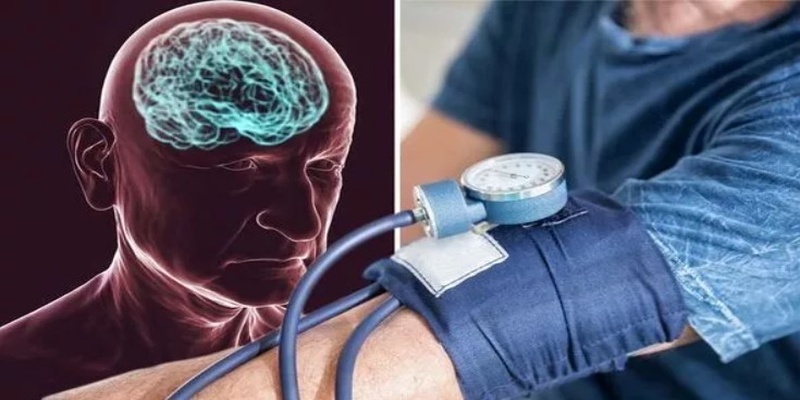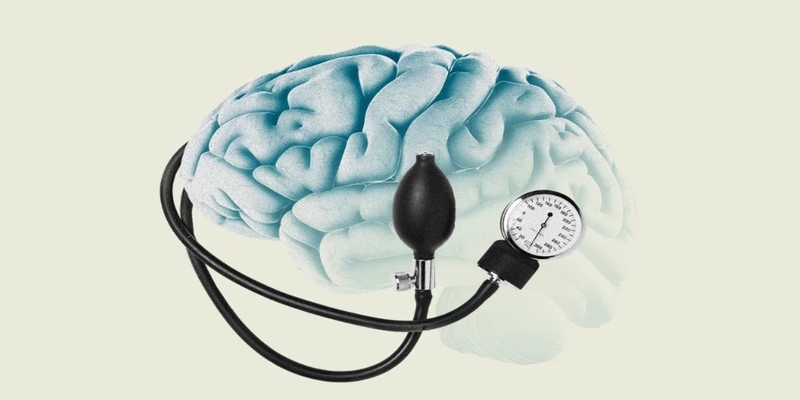This article is all about high blood pressure in early adulthood tied to middle-aged brain dysfunction. You might be wondering how it is possible. It is because high blood pressure is a silent killer. It can not only affect your overall health but also damage many other organs.
The brain, heart, and kidneys are the three main targets of hypertension. Especially if you develop high blood pressure early in life, you are at higher risk of developing brain dysfunctions such as dementia, memory loss, or brain stroke.
Therefore, it is crucial to check your blood pressure regularly for early detection and treat it as soon as possible. It can save you from many problems later in life. Keep reading to explore more!
High Blood Pressure: What Leads To Hypertension?

Hypertension, or high blood pressure, is a condition that occurs when the pressure of blood against artery walls is too high. It happens when your blood pressure is not normal (120/80 mm Hg) and consistently hits 130/80 or higher.
This condition is serious because it can cause other serious problems like brain dysfunction, heart attacks, and strokes.
High blood pressure could result from any of the following:
- Poor dietary practices
- Older age
- Insufficient exercise
- Excess weight
- Consumption of too much salt
- Diabetes type 2
- Smoking
- Stress and anxiety
- High levels of cholesterol
- Genetic factors
- Prolonged kidney illnesses
- Endocrine issues
- Obstructive sleep apnea
- Cardiovascular conditions
- Thyroid gland problems
If you are suffering from hypertension, you should not ignore risk factors like an unhealthy diet (too much salt, saturated fats, not taking enough fruits and vegetables), not exercising, smoking and drinking too much, and being overweight or obese.
Also, the environment plays a big role in high blood pressure and related health issues, with air pollution being the main problem.
Symptoms of High Blood Pressure
Patients suffering from hypertension may experience some of these symptoms. If so, thats the time to visit a doctor and immediately start the treatment to avoid further complications.
- Headaches
- Dizziness
- Chest pain
- Difficulty in breathing
- Nausea and vomiting
- Disturbed vision
- Anxiety and confusion
- Nosebleeds
- Irregular heartbeat.
The Connection Between Early Adulthood and Brain Health

Many researches show that having high blood pressure in your 30s can lead to poorer brain health by age 75, particularly in men. A study compared brain scans of older adults with high blood pressure in their 30s to those with normal blood pressure.
The results showed that the high blood pressure group had smaller brain areas and weaker white matter, both linked to dementia. This and many other types of research prove that adulthood hypertension and brain dysfunction are definitely associated.
These results highlight how important it is to treat high blood pressure early to prevent brain health issues later in life.
Brain Dysfunctions Due to High Blood Pressure
Here are the most common brain dysfunctions linked to early adulthood hypertension:
Dementia
If you are in your mid-twenties or thirties and suffering from hypertension, there is a high risk of getting dementia later in your life. But, the good news is the risk is reduced if you develop hypertension later in life. The reason is that high blood pressure has three main targets, and the brain is one of them.
Dementia happens when the arteries that are too narrow or blocked can reduce blood supply to the brain, potentially causing vascular dementia. This can result from a single stroke or several small strokes that disrupt blood flow to the brain.
Blood-brain Barrier Dysfunction
Another drawback of early adulthood hypertension is blood-brain barrier dysfunction later in life. The blood-brain barrier is crucial for keeping the brain's environment stable by stopping substances from entering the brain's space.
The brain cells are linked by tight junctions to prevent substances from moving freely. Hypertension is one of its significant causes.
Stroke
A stroke occurs when a brain area doesn't receive enough oxygen or nutrients or when there's bleeding in or around the brain. This leads to the death of brain cells.
High blood pressure can damage blood vessels, making them narrow, break, or leak. It can also cause blood clots to develop in the arteries to the brain, blocking blood flow and increasing the risk of a stroke.
Mild Cognitive Impairment
This condition means you experience more difficulty in memory, language, or thinking than other adults of your age.
Although these changes are not severe enough to affect your daily life like dementia does, it still has some negative effects. Early-age high blood pressure can cause mild cognitive impairment.
Preventative Measures for Young Adults to Protect Brain Health

The below-mentioned preventive measures are really helpful in controlling and avoiding hypertension at an early age:
Maintaining Healthy Blood Pressure Levels
Blood pressure can lead to severe illnesses later in life. So young adults should get their blood pressure regularly checked and maintain it within the normal range.
Lifestyle Modifications and Their Impact
Lifestyle changes like a healthy diet, exercise, incorporation of fruits and vegetables, avoiding processed foods and smoking can have great positive impacts and help in controlling hypertension.
Stress Management Techniques
Stress and Anxiety have a great impact on blood pressure and overall brain health. Try stress-reducing techniques and exercises like yoga.
Importance of Early Detection
Early diagnosis and treatment of high blood pressure helps avoid serious health problems like brain disease and stroke. It also makes it easier to control with lifestyle changes and medicine. This can lead to a happy and healthy elderly life.
Conclusion
This article is all about high blood pressure in early adulthood tied to middle-aged brain dysfunction. Hypertension is a condition that occurs when blood pressure is significantly higher than regular 120/80 mm Hg.
It can result from poor dietary practices, insufficient exercise, excess weight, consumption of too much salt, stress, or others.
High blood pressure in early adulthood is linked to middle-aged brain dysfunction and can lead to brain dysfunctions such as dementia, memory loss, or brain stroke.
Early detection and treatment of high blood pressure can prevent brain health issues later in life.
So, everyone in their early adulthood should pay attention and control their blood pressure for a healthy and happy future.







